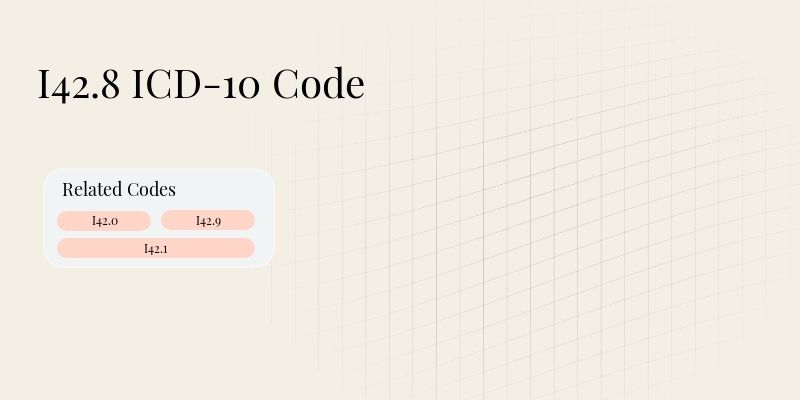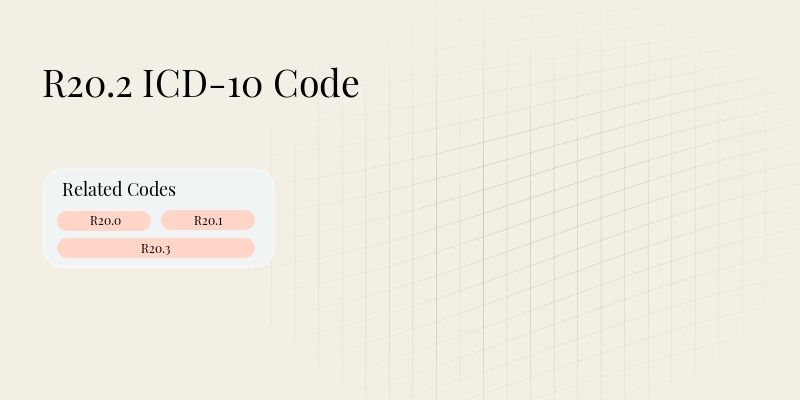
I42.8 ICD-10 Code: Nonischemic Cardiomyopathy

Key Takeaways
- What I42.8 ICD-10 Code Covers: This code is designated for nonischemic cardiomyopathy, which refers to heart muscle disease not resulting from reduced blood flow. It encompasses various cardiomyopathy subtypes, such as dilated, hypertrophic, and restrictive forms.
- Session duration requirements: Documentation must clearly indicate the duration of treatment sessions, detailing how long the patient was under care and the nature of services provided.
- Who can use the code: This code can be used by cardiologists, primary care physicians, and any healthcare provider involved in diagnosing or managing a patient with nonischemic cardiomyopathy.
- Best practice for proper use: Accurate documentation is essential, including patient history, symptoms, and diagnostic tests performed. This ensures proper coding and reduces the risk of denials.
- Example of actual usage: A cardiologist documents a patient’s diagnosis of dilated cardiomyopathy, specifying the echocardiogram results and treatment plan, which justifies the use of this code.
What is I42.8 ICD-10 Code
The I42.8 ICD‑10 code specifically refers to nonischemic cardiomyopathy, which is a term used for heart muscle diseases that are not caused by ischemic heart conditions. These conditions can lead to structural and functional abnormalities of the heart, which may result in heart failure, arrhythmias, or sudden cardiac death.
This classification encompasses several subtypes of cardiomyopathy, including but not limited to dilated cardiomyopathy, hypertrophic cardiomyopathy, and restrictive cardiomyopathy. Each subtype has unique characteristics and treatment approaches, making the accurate coding of this condition essential for appropriate clinical management and reimbursement.
Services Covered Under I42.8 ICD-10 Code
Several medical services are covered under this code, often requiring careful documentation to justify their necessity and appropriateness. The following table summarizes these services:
Service Type | Description | Typical Coding Associated |
|---|---|---|
Diagnostic Testing | Echocardiograms and MRIs to assess heart structure and function. | 93306, 75557 |
Medications | Prescription medications such as ACE inhibitors or beta-blockers for treatment. | Various NDC codes |
Monitoring | Regular follow-ups to monitor heart function and symptoms. | 99213, 99214 |
Patient Education | Counseling on lifestyle management and disease understanding. | 99401 |
Who Can Use the I42.8 ICD-10 Code?
This code can be employed by various healthcare professionals involved in the care of patients with nonischemic cardiomyopathy. The following groups can use this code:
- Cardiologists: Specialists who diagnose and treat heart conditions, often applying this code in patient records.
- Primary Care Physicians: General practitioners may use this code when referring patients for cardiology consultations or managing care.
- Nurse Practitioners: Advanced practice nurses who manage patients with chronic heart conditions can apply this code in their documentation.
- Physician Assistants: Assistants in cardiology settings may also use this code for diagnosing and documenting patient conditions.
How to Use I42.8 ICD-10 Code
Using this code correctly requires a clear understanding of the patient’s diagnosis and treatment plan. Here are detailed steps:
- Document the Diagnosis: Clearly state the diagnosis of nonischemic cardiomyopathy in the patient’s medical record. For example, a patient diagnosed with restrictive cardiomyopathy should have this prominently noted.
- Include Relevant Tests: Record any tests that support the diagnosis, such as echocardiograms or MRIs. An example would be: "Echocardiogram shows left ventricular hypertrophy, consistent with hypertrophic cardiomyopathy."
- Outline Treatment Plans: Clearly outline the treatment plan, including medications and follow-up appointments. For instance, "Patient prescribed beta-blockers and scheduled for biannual follow-ups."
Reimbursement Rates for I42.8 ICD-10 Code
Insurance Type | Reimbursement Rate |
|---|---|
Private Insurance | $120 - $150 per visit |
Medicare | $80 - $100 per visit |
Medicaid | $60 - $80 per visit |
Disclaimer: Reimbursement rates can vary based on numerous factors, including the provider's location, the patient's specific plan, and recent changes in policy. This article will be updated to reflect average prices regularly.
Benefits of I42.8 ICD-10 Code
This code provides various benefits to healthcare providers, ensuring they can deliver focused care. The following table highlights these advantages:
Benefit | Description |
|---|---|
Accurate Diagnosis | Ensures patients receive appropriate treatment based on their specific heart condition. |
Improved Reimbursement | Correct coding leads to better reimbursement rates from insurance providers. |
Enhanced Patient Care | Allows for tailored treatment plans, improving patient outcomes and satisfaction. |
Efficient Communication | Facilitates clear communication among healthcare providers regarding the patient's condition and treatment. |
Common Mistakes to Avoid with I42.8 ICD-10 Code
Improper use of this code can lead to audits, claim denials, and financial losses. Here are some common mistakes to avoid:
- Incorrect Diagnosis Coding: Sometimes healthcare providers use the wrong cardiomyopathy code. For instance, coding a patient with dilated cardiomyopathy as ischemic leads to claim denials.
- Lack of Supporting Documentation: Failing to include necessary diagnostic tests or treatment plans can result in incomplete claims. For example, if an echocardiogram is not documented, reimbursement may be denied.
- Inconsistency in Documentation: Inconsistencies between the diagnosis and treatment plan can raise red flags. A physician mentioning heart failure without specifying cardiomyopathy can cause confusion.
- Failure to Update Records: Not updating patient records with new diagnoses or treatment plans can lead to outdated coding. For instance, if a patient's condition worsens but the documentation remains unchanged, it may lead to reimbursement issues.
I42.8 ICD-10 Code vs other codes
Understanding the differences between various cardiomyopathy codes is crucial for accurate coding. The following table compares I42.8 with related codes:
Code | Description | Usage Context |
|---|---|---|
I42.0 | Dilated cardiomyopathy | Used when the patient presents with symptoms of heart failure and left ventricular dilation. |
I42.1 | Hypertrophic cardiomyopathy | Applicable when thickening of the heart muscle is diagnosed. |
I42.9 | Cardiomyopathy, unspecified | Used when the specific type of cardiomyopathy is unknown or not specified. |
Conclusion
The I42.8 ICD‑10 code is essential for accurately diagnosing and managing nonischemic cardiomyopathy, offering various benefits to healthcare providers, including enhanced patient care and improved reimbursement rates. Proper documentation is critical, ensuring that the diagnosis, treatment plans, and relevant tests are clearly outlined to support the use of this code. Healthcare professionals across specialties, including cardiologists and primary care physicians, can use this code, but they must be aware of common pitfalls to avoid, such as incorrect coding and inadequate documentation. By understanding the services covered and the reimbursement landscape, providers can navigate the complexities of coding effectively, ultimately leading to better care for patients with this condition. Overall, mastering the details surrounding the I42.8 code enhances clinical practice and promotes optimal patient outcomes.
Disclaimer: This article is for informational purposes only and does not constitute legal or medical advice. Always consult professional guidelines and regulatory bodies for specific compliance requirements.
Frequently Asked Questions
Reduce burnout,
improve patient care.
Join thousands of clinicians already using AI to become more efficient.

R20.2 ICD-10 Code: Paresthesia of skin
Discover essential insights on the R20.2 ICD-10 Code code for health professionals. Enhance your practice and navigate billing with confidence.

90838 CPT Code: Psychotherapy, 60 minutes, present
Discover essential insights on the 90838 CPT code for health professionals. Enhance your practice and navigate billing with confidence.

F33.0 ICD-10 Code: Major Depressive Disorder
Discover essential insights on the F33.0 ICD-10 Code code for health professionals. Enhance your practice and navigate billing with confidence.
